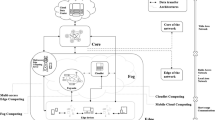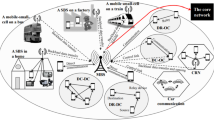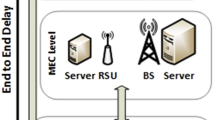Abstract
In this paper, we investigate a MEC relay-assisted system with multiple relay nodes (RNs) and multiple remote servers (RSs), where both the selections of best RN and RS are considered. In order to explore the diversity of both RNs and RSs, we propose a sequential relay-remote selection and offloading strategy by taking the local computing, relay computing and remote computing into consideration. The sequential relay-remote selection strategy specifies when to stop server discovery and carry out computation offloading. The offloading strategy tells what are the optimal portions of task executed locally, at RN and at RS. Under such framework, we seek to minimize the total energy consumption coming from server detection, data transmission and data execution. We formulate this problem as a stochastic sequential decision-making problem and dynamic programming is applied to obtain the optimal strategy. The performance of our proposed strategy is evaluated using simulation results. It is found that the energy consumption can be reduced by jointly considering the design of sequential relay-remote selection and offloading ratio optimization.











Similar content being viewed by others
References
Dinh HT, Lee C, Niyato D, Wang P (2013) A survey of mobile cloud computing: architecture, applications, and approaches. Wirel Commun Mob Comput 1587–1611:13
Mao Y, You C, Zhang J, Huang K, Letaief KB (2017) A survey on mobile edge computing: the communication perspective. IEEE Commun Surv Tutor 19(4):2322–2358
Sanaei Z, Abolfazli S, Gani A, Buyya R (2014) Heterogeneity in mobile cloud computing: taxonomy and open challenges. IEEE Commun Surv Tutor 16(1):369–392
Bonomi F, Milito R, Zhu J, Addepalli S (2012) Fog computing and its role in the internet of things. In: MCC workshop on mobile cloud computing, pp 13–16
Mtibaa A, Fahim A, Harras KA, Ammar MH (2013) Towards resource sharing in mobile device clouds: power balancing across mobile devices. In: ACM SIGCOMM workshop on mobile cloud computing, pp 51–56
Hu YC, Patel M, Sabella D, Sprecher N, Young V (2015) Mobile edge computing a key technology towards 5G-first edition
Abbas N, Zhang Y, Taherkordi A, Skeie T (2018) Mobile edge computing: a survey. IEEE Internet of Things J 5(1):450–465
Roman R, Lopez J, Mambo M, Mobile Edge Computing, Fog et al. (Noc 2016) A survey and analysis of security threats and challenges. Future Gener Comput Syst
Mach P, Becvar Z (2017) Mobile edge computing: a survey on architecture and computation offloading. IEEE Commun Surv Tutor 19(3):1628–1656
Wang C, Liang C, Yu FR, Chen Q, Tang L (2017) Computation offloading and resource allocation in wireless cellular networks with mobile edge computing. IEEE Trans Wirel Commun 16(8):4924–4938
Deng M, Tian H, Fan B (2016) Fine-granularity based application offloading policy in small cell cloud-enhanced networks. In: IEEE international conference on communications workshops (ICC), pp 638–643
Sun H, Zhou F, Qingyang Hu R (2019) Joint offloading and computation energy efficiency maximization in a mobile edge computing system. IEEE Trans Veh Technol 68(3):3052–3056
Zhoua S, Jadoona W (2020) The partial computation offloading strategy based on game theory for multi-user in mobile edge computing environment. Comput Netw 178
Saleem U, Liu Y, Jangsher S, Tao X, Li Y (Apr 2020) Latency minimization for D2D-enabled partial computation offloading in mobile edge computing. IEEE Trans Veh Technol 69(4)
Huang X, Zhang W, Yang J, Yang L, Yeo CK (2021) Market-based dynamic resource allocation in mobile edge computing systems with multi-server and multi-user. Comput Commun 165:43–52
Wang Y, Min S, Wang X, Wang L, Li J (2016) Mobile-edge computing: partial computation offloading using dynamic voltage scaling. IEEE Trans Commun 64(10):4268–4282
Bi S, Zhang YJ (2018) Computation rate maximization for wireless powered mobile-edge computing with binary computation offloading. IEEE Trans Wirel Commun 17(6):4177–4190
Wang Y, Sheng M, Wang X, Wang L, Li J (2016) Mobile-edge computing: partial computation offloading using dynamic voltage scaling. IEEE Trans Commun 64(10):4268–4282
Liang J, Chen Z, Li C, Xia B (Aug. 2019) Delay outage probability of multi-relay selection for mobile relay edge computing system. In: IEEE/CIC international conference on communications in China (ICCC), Changchun, China, 11–13 Aug. 2019
Wang L, Hanzo L (2011) Dispensing with channel estimation: differentially modulated cooperative wireless communications. IEEE Commun Surv Tutor 14(3):836–857
Krikidis I (2015) Relay selection in wireless powered cooperative networks with energy storage. IEEE J Sel Areas Commun 33(12):2596–2610
Cao X, Wang F, Xu J, Zhang R, Cui S (2019) Joint computation and communication cooperation for energy-efficient mobile edge computing. IEEE Internet Things J 6(3):4188–4200
Ning Z, Dong P, Kong X, Xia F (2019) A cooperative partial computation offloading scheme for mobile edge computing enabled internet of things. IEEE Internet Things J 6(3):4804–4814
Xie B, Zhang Q, Qin J (2020) Joint optimization of cooperative communication and computation in two-way relay MEC systems. IEEE Trans Veh Technol 69(4):4596–4600
Chen X, Cai Y, Shi Q, Zhao M, Champagne B, Hanzo L (2020) Efficient resource allocation for relay-assisted computation offloading in mobile-edge computing. IEEE Internet Things J 7(3):2452–2468
Rahman M, Lee Y, Koo I (2018) Energy-efficient power allocation and relay selection schemes for relay-assisted D2D communications in 5G wireless networks. Sensors 18(9):2865
Li Y, Xu G, Yang K, Ge J, Liu P, Jin Z (2020) Energy efficient relay selection and resource allocation in D2D-enabled mobile edge computing. IEEE Trans Veh Technol (Early Access). https://doi.org/10.1109/TVT.2020.3036489
Chen Z, Xiao N, Han D (2020) Multilevel task offloading and resource optimization of edge computing networks considering UAV relay and green energy. Appl Sci 10(7):2592
Bertsekas DP (2000) Dynamic programming and optimal control, 2nd edn. Athena Scientific, vol 1
Pei Y, Liang Y-C, Teh KC, Li KH (2011) Energy-efficient design of sequential channel sensing in cognitive radio networks: optimal sensing strategy, power allocation and sensing order. IEEE J Sel Areas Commun 29(8)
Acknowledgements
This work is supported by Natural Science Funds of China (No. 61701213), Natural Science Funds of Fujian (No. 2020J01813).
Author information
Authors and Affiliations
Corresponding author
Additional information
Publisher's Note
Springer Nature remains neutral with regard to jurisdictional claims in published maps and institutional affiliations.
Rights and permissions
About this article
Cite this article
Chen, C., Guo, R., Zhang, W. et al. Optimal sequential relay-remote selection and computation offloading in mobile edge computing. J Supercomput 78, 1093–1116 (2022). https://doi.org/10.1007/s11227-021-03919-w
Accepted:
Published:
Issue Date:
DOI: https://doi.org/10.1007/s11227-021-03919-w




